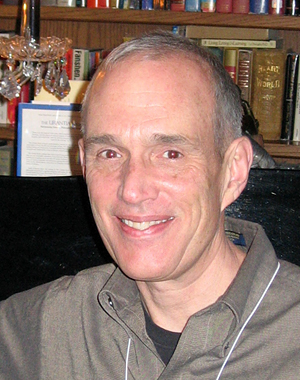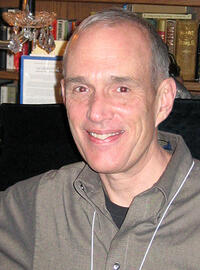Urantia Foundation Staff: Jay Peregrine
Urantia Foundation Staff: Jay Peregrine
 In this interview Jay Peregrine—Executive Director of Urantia Foundation for the past three years—shares a bit about how he found his way to The Urantia Book and his hopes for the future of the Urantia Revelation.
In this interview Jay Peregrine—Executive Director of Urantia Foundation for the past three years—shares a bit about how he found his way to The Urantia Book and his hopes for the future of the Urantia Revelation.
Where were you born and where did you grow up?
I was born and raised in Oak Park & River Forest, Illinois. My family was "quietly" religious; I went to church every Sunday and started singing in the boy's choir when I was eight. We had a Sunday evening family Bible study for years. I've believed in God and Jesus as long as I can remember. I've always liked going to church.
My mother died when I was seven, which I think triggered my spiritual searching, maybe a little earlier than would have happened otherwise. After a normal and nurturing first seven years, my next few years were increasingly tumultuous and difficult. Maybe not so out of the ordinary. The resolution of all the internal conflicts of those years came when I decided to dedicate myself to the Truth at all costs, and set out to find out for myself what my life was about.
When and how did you find The Urantia Book?
I spent a lot of time in my early 20's reading everything I could find about religion and spirituality, and trying out this and that. I lived in a Buddhist ashram for awhile. I practiced Transcendental Meditation. From all of these experiences I gleaned what I thought was the best, what I thought of as "my religion." I was convinced, as the result of an idea that came into my head while meditating one day, that there was a "third testament," a book that I needed to find. It took me about three years, and moving across the country. I found The Urantia Book in a metaphysical bookstore in San Francisco in 1974, and from the moment I started reading it I knew I had found what I was looking for.
Strangely enough, it turned out that my grandfather, a lawyer, had known the Hales family socially in Oak Park, and probably through that connection my father, also a lawyer, had done legal work for the Sadler family in the 1960's. My Dad had heard about The Urantia Book, but had never read it, and never mentioned it to me.
What do you like best about The Urantia Book?
That question is hard to answer! There are so many things I like about the book – but I'll chose one: Someone once said that The Urantia Book is like a symphony; themes are stated, worked on, give way to new themes, only to reappear later on in another form. It is such a great literary masterpiece that when I first started to read it I found I didn't care who wrote it, or where it came from. It was simply thrilling to read! To this day I can assure inquirers that if they take the time to read the book I guarantee them it will be worth it. It's a good book! But I refuse to summarize it. It would be, I say, like trying to summarize a great symphony by humming a theme or two. You still need to listen to the real thing to appreciate what the composer was trying to communicate.
How did you find your way to Urantia Foundation?
It's a little of a mystery to me. Like many readers, I thought a lot about the role of the various Urantia groups over the years. As a result of a topical study I did in the late 1980's I came to the conclusion – right around the time of the "split" – that Urantia Foundation had a unique and important role to play in the movement as a whole. So I developed an approach of "if it's broken, let's fix it, but we mustn't lose the essence of its critical role." This lead me to get more and more involved, first as a volunteer on the Coordinating Committee, then doing work on weekends for the Foundation (flying in from San Francisco), and finally in 1998 to accepting a position on the staff. In the last ten years I've learned through lots of hands-on experience the mechanics of keeping a small not-for-profit running.
What are your hopes for the Urantia Revelation?
I'm one of those who believes that this is a long-term project, and that we are in the preparatory stage. We need to be patient, and learn to live the teachings we've found in this book. The world does not need a religion "about The Urantia Book" but it does need a new breed of religionists who dare to live the religion of Jesus.
I've found myself focused the past few years therefore on taking that challenge seriously, while working on getting the book itself out into the world, into bookstores, into the
hands of people who will read it and think about the ideas it contains. I believe that the book contains within itself the seeds of spiritual growth which, when planted in fertile soil, will take root and in time bear fruit.
